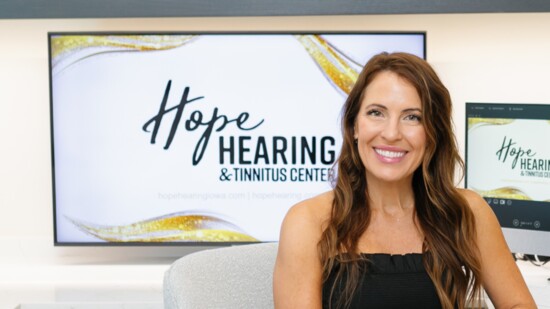This month, audiologist Dr. Beki Kellogg of Hope Hearting & Tinnitus Center in Southlake responds to some of the most common questions she’s asked by patients about hearing and tinnitus. The practice helps patients find hope and get relief. Dr. Kellogg is joined in the practice by colleagues Dr. Mary Allen Pollok and Dr. Lizzy Jackson.
What is tinnitus?
Tinnitus is characterized by the perception of sound that is actually not in your environment. People often describe it as a ringing, buzzing, chirping, crickets, bells, chimes or saccades in the ears. A few patients have even experienced musician ear syndrome, which is musical tinnitus. When I practiced in Denver, one patient said it sounded like fracking. We have heard a variety of descriptions.
What causes tinnitus?
There are numerous causes of tinnitus, but the most common is stress and noise exposure. Other reasons are untreated hearing loss, head/neck injuries, dental issues, buildup of wax in the ears, allergies, fluid in the ears - and there are over 200 medications that can cause tinnitus. At times we might not know the exact cause because it can be a combination of all the above.
What do most people say after getting their tinnitus treated?
Patients say they had no idea how much it was bothering them until it was better! Often tinnitus can slowly creep into someone’s life, and after being told they should just live with it, they give up thinking anything can be done. Tinnitus can impact concentration, sleep, hearing and mood, which takes a toll on multiple areas of your quality of life. Many studies show leaving tinnitus untreated can have a negative impact on cognition too. There are so many positive things you can do for your health by treating your tinnitus and hearing!
What is the connection between the brain and hearing?
Johns Hopkins, MIT and Harvard have all confirmed the link between untreated tinnitus, hearing loss and dementia/cognitive decline. A recent Lancet study revealed that treating tinnitus and hearing loss is the most modifiable risk factor for preventing dementia!
Why do people say there’s nothing you can do about it?
Physicians often don’t treat tinnitus, as they are well-trained in medical solutions that involve surgery and medication - but this is where we come in as tinnitus specialists to help with our research-based treatment.
Do you only treat tinnitus patients?
We specialize in both hearing loss and tinnitus at Hope Hearing. We can also help those with hyperacusis, or a sensitivity to sounds. You do not have to have tinnitus to have hearing loss. Many tinnitus patients’ hearing results are within the normal range. Hyperacusis, sensitivity to sound, can be treated in a similar method of how we treat tinnitus. Whichever auditory issue you are experiencing, you would be provided with high quality care from licensed Doctors of Audiology. Everything we do is research based, and we can create customized treatment plans for you.
What do you like most about what you do?
We all love going the extra mile to truly help those who thought they had to live with tinnitus. It’s a journey that makes working at Hope so rewarding. When someone becomes a patient of ours, it’s like they become part of our family. Seeing so many people get relief and success with our treatment plan gives us an incredible amount of joy. We love what we get to do every day!
“Seeing so many people get relief and success with our treatment plan gives us an incredible amount of joy.”
